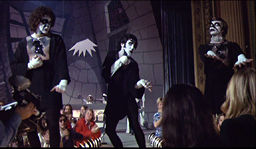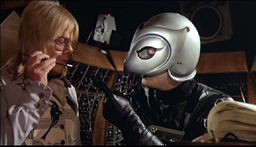
One of the most challenging films from Brian De Palma, Phantom of the Paradise marks the turning point between his edgy early films (such as Greetings and Sisters) and more commercially accessible but no less worthy fare like Carrie and The Fury. While both of these phases contain the quirky humor and film buff in-jokes which grabbed critics' attention, Phantom feels in many ways like the work of a director determined to go for broke with his one shot at directing. Every idea no matter how insane appears to have been thrown in the blender, producing a collage of music, horror, and satire unlike any other.
Recording mogul Swan (Paul Williams) - "He has no other name," according to the Rod Serling intro - makes a new enemy in the form of Winslow Leach (William Finley), an aspiring songwriter whose Faust cantata is stolen to be the opening performance of Swan's rock dream palace, the Paradise. In a fit of rage Winslow attempts to exact revenge on Swan, only to wind up with his face disfigured in a vinyl pressing plant mishap. The misshapen Swan dons a bird-like metal mask and becomes the Phantom, a thorn in Swan's side determined to see Faust performed by Winslow's own choice for the lead role, upcoming ingenue Phoenix (Jessica Harper). Swan instead betrays Winslow and opts to give the plum role to Beef (Gerrit Graham), a comical glam queen; naturally this double cross sets off an inevitable, supernatural chain of events culminating in a wild finale during the Paradise curtain raiser.
With its barrage of classic horror references, its simultaneous embrace and critique of the glam rock lifestyle, and its pansexual playfulness, Phantom has often drawn comparisons to its more famous contemporary, The Rocky Horror Picture Show, with which it also shares an inability to keep the storyline under control during a frenzied climax. Fortunately its flaws are glossed over by the sheer energy involved, from De Palma's creative and resourceful staging to the fine performances (both in terms of acting and singing). Williams may be an
Owners of the godawful laserdisc and VHS editions of Phantom of the Paradise will be relieved to know that Fox has done wonders for the film's reputation with this DVD transfer. The earlier "stereo" sound simply presented the mono channel with slightly different volumes from left to right, but the DVD contains the original full, vibrant stereo mix, with dialogue located in the center channel and music nicely spread out to the left and right. Don't expect any surround activity - an optional 5.1 mix would have been nice, if not necessary - but this is the best the film has sounded by far since it played in theaters. The image quality is also a vast improvement; the fuzzy, muddy video of the past can now be forgotten. The cropping of the 1.85:1 original image didn't really harm the film (and the split screen bit was always letterboxed), but the extra breathing room on the left and right makes some of the more chaotic camera set ups easier to take. The disc also includes a "theatrical trailer," which lacks even a basic title card and actually looks more like a random assortment of scenes slapped together by someone on a video deck. Far more satisfying is the French Blu-ray, which is region free and looks gorgeous; the audio is also notably improved. Extras include a hilarious video intro by Graham (speaking French!), the real theatrical trailers, and a fantastic documentary with De Palma and most of the cast and crew reminiscing about their intrepid project, which can now stand proudly among the best cult classics of its decade.
Directed by Brian De Palma / Starring Paul Williams, William Finley, Jessica Harper, George Memmoli, Gerrit Graham
Opening (Blu-ray & DVD) (France R0 HD/PAL), Fox (DVD) (US R1 NTSC) / WS (1.85:1) (16:9) / DD2.0

 acquired taste, but his witty score kicks along nicely from '50s be bop to surfer parody to KISS-style rock without missing a beat. As usual Harper steals all of her scenes, making one wish she had become a much bigger star in an age when both musical and acting talent were appreciated. (Ironically, she later appeared as Janet and acquitted herself quite well in the ill-fated but not uninteresting Rocky Horror sequel, Shock Treatment.) De Palma fans will have fun looking for early examples of his directorial quirks, such as his trademark use of split screen during the Beach Bums number. It doesn't outdo Sisters, but at least he tried. Of course there's also a Hitchcock nod this time around, thanks to one of the first and greatest Psycho parodies on record.
acquired taste, but his witty score kicks along nicely from '50s be bop to surfer parody to KISS-style rock without missing a beat. As usual Harper steals all of her scenes, making one wish she had become a much bigger star in an age when both musical and acting talent were appreciated. (Ironically, she later appeared as Janet and acquitted herself quite well in the ill-fated but not uninteresting Rocky Horror sequel, Shock Treatment.) De Palma fans will have fun looking for early examples of his directorial quirks, such as his trademark use of split screen during the Beach Bums number. It doesn't outdo Sisters, but at least he tried. Of course there's also a Hitchcock nod this time around, thanks to one of the first and greatest Psycho parodies on record.
